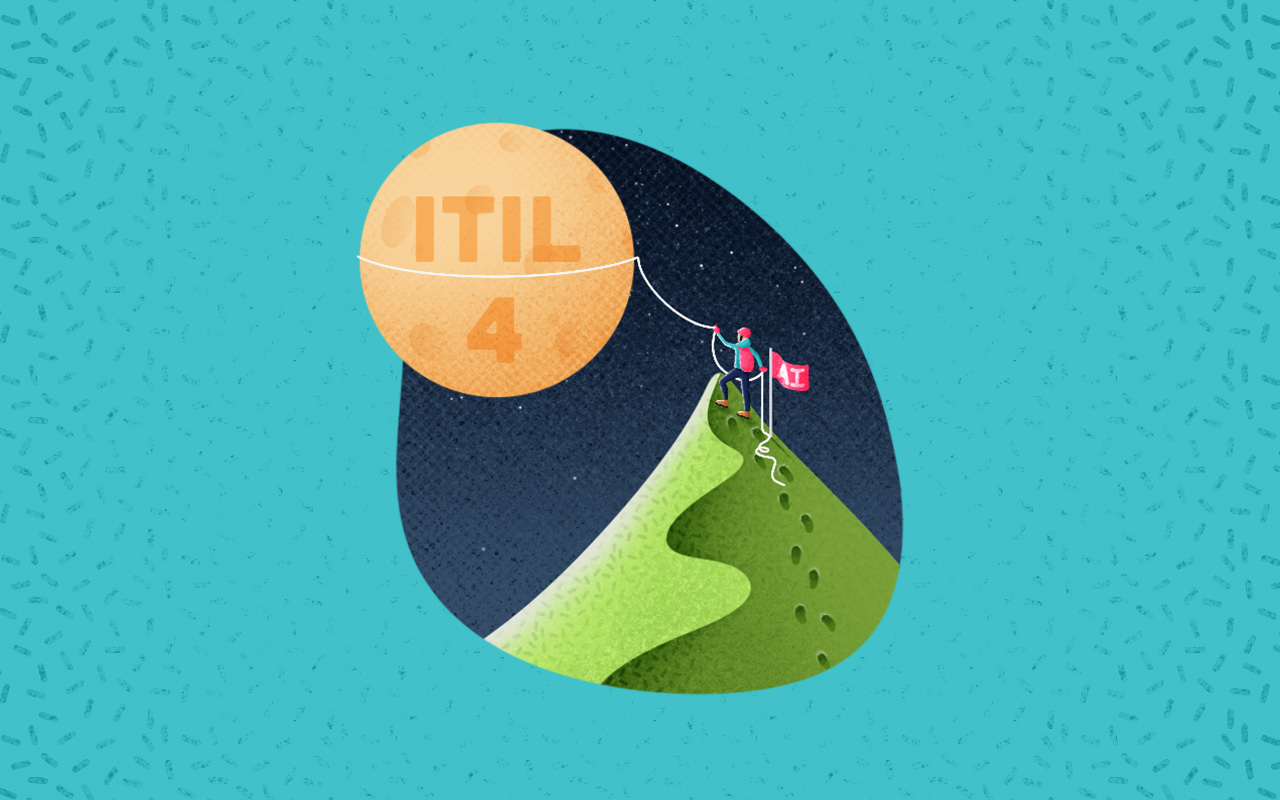In the tech world, the Information Technology Infrastructure Library (ITIL) framework and AI (Artificial Intelligence) often get dismissed as mere jargon in ITSM (IT Service Management). To be fair, that sentence alone is an acronym salad. Yet, the truth goes beyond the hype: ITIL 4 and AI offer significant, tangible benefits.
ITIL 4 provides essential standards for IT service management, albeit with its challenges. AI, while surrounded by excitement, brings efficiency and innovation to the table. They aren’t a magic solution but together form a powerful strategy for dealing with today’s IT complexities.
This piece aims to clear the air, showing how combining ITIL 4’s guidelines with AI’s smart automation can practically push businesses ahead.
Understanding ITSM and ITIL 4
Before delving into the role of AI in ITSM, it’s crucial to understand the fundamentals of ITSM and the latest iteration of the ITIL framework, ITIL 4.
IT Service Management (ITSM): ITSM encompasses the processes, policies, and strategies implemented by an organization to design, deliver, manage, and improve IT services offered to customers. It focuses on aligning IT services with the needs of the business while ensuring efficient operations and continual improvement.
ITIL 4: ITIL 4 is the latest evolution of the ITIL framework, designed to address modern IT challenges and embrace new ways of working, such as Agile, DevOps, and Lean practices. It provides a holistic approach to service management, emphasizing collaboration, flexibility, and value co-creation.
ITIL 4, the latest evolution of the Information Technology Infrastructure Library, was developed by AXELOS to represent a comprehensive framework for IT Service Management (ITSM). It builds upon the principles and practices established in previous iterations, while also addressing the evolving needs of modern organizations. At its core, ITIL 4 introduces the Service Value System (SVS), which provides a holistic approach to service management by encompassing various components such as the Service Value Chain, guiding principles, governance, and continual improvement. Additionally, ITIL 4 introduces seven guiding principles that underpin decision-making and behavior within organizations, emphasizing value creation, collaboration, and simplicity. Lastly, ITIL 4 expands the scope of service management by introducing the four dimensions model, which considers organizations and people, information and technology, partners and suppliers, and value streams and processes.
It’s important to acknowledge one thing that remains unchanged: ITIL still does not provide direct, pragmatic guidance on how to properly implement and execute on its own framework. How organizations actually do this—and their level of success—varies.
This also means new tools and technology, changes in market capability, and emerging organizational and process best practices are still improving how organizations use ITIL.
In other words, how people implement ITIL is still changing and has plenty of room to get better. AI is a great example of this.
7 ITIL 4 Guiding Principles
- Focus on value
- Start where you are
- Progress iteratively with feedback
- Collaborate and promote visibility
- Think and work holistically
- Keep it simple and practical
- Optimize and automate
The Role of AI in ITSM ITIL 4 Journey
AI has emerged as a game-changer in ITSM (not to say that there isn’t a little hype – we’re looking at you, ChatGPT). The technology offers advanced capabilities to automate tasks, enhance user experiences, reduce operating costs, increase staff productivity, provide 24/7 support, and more–done via 100% without human involvement, or with the support humans to automate processes for humans.
How AI supports various aspects of an organization’s ITSM ITIL 4 journey to improve service quality, and drive business success in today’s dynamic and competitive landscape:
AI-powered chatbots and virtual assistants (software that’s built to engage with customers) are built to be the first line of defense for a company. They can capture potential customer leads, deal with simple queries (pre-programmed with the responses and information needed to provide answers), and point a user to the right area of support (re-direct to an actual human). They are important in that they handle a high level of incoming incidents and service requests ASAP—providing immediate support and resolutions, even after business hours, providing 24/7/365/forever IT support.
By leveraging natural language processing (NLP) and machine learning algorithms, these AI-driven systems can understand user queries, diagnose issues, and suggest solutions based on historical data and knowledge bases. This not only reduces the burden on IT support teams but also improves the overall user experience by providing faster resolution times and 24/7 support availability.
AI enables proactive problem management by analyzing vast amounts of data to identify patterns, trends, and recurring issues within the IT environment. Organizations should first apply AI to predictive problem identification. For instance, AI can analyze patterns in server performance logs to predict and alert potential hardware failures before they occur. This early detection enables preemptive maintenance, preventing costly downtime and ensuring smoother operations. This strategic application of AI sets the foundation for further advancements in areas such as root cause analysis and automated remediation, significantly boosting the value ITIL 4 delivers to problem management.
AI augments change management processes by assessing the impact and risk of proposed changes more accurately. By analyzing historical data, system dependencies, and environmental factors, AI algorithms can provide insights into the potential outcomes of proposed changes, allowing organizations to make informed decisions and prioritize change initiatives effectively. Additionally, AI-driven automation can facilitate the execution of routine changes, reducing manual effort and minimizing the risk of human errors.
4. Service Desk Optimization
AI-driven analytics and automation tools can optimize service desk operations by analyzing ticket data, categorizing incidents, and identifying recurring issues. By implementing intelligent routing algorithms, AI can ensure that tickets are assigned to the most appropriate support teams or individuals based on skillset, availability, and workload. Moreover, AI-powered self-service portals empower users to resolve common issues independently, freeing up IT resources to focus on more complex tasks and strategic initiatives.
AI enhances knowledge management practices by automating the creation, curation, and dissemination of knowledge articles. Natural language processing techniques enable AI systems to extract insights from unstructured data sources such as documents, emails, and chat transcripts, enriching knowledge bases with relevant and up-to-date information. By leveraging AI-driven recommendation engines, organizations can deliver personalized and context-aware knowledge content to users—empowering them to find solutions quickly and efficiently.
6. Continuous Improvement
AI facilitates continuous improvement initiatives by analyzing performance metrics, user feedback, and operational data to identify opportunities for optimization. Machine learning algorithms can detect trends, anomalies, and inefficiencies within ITSM processes, enabling organizations to refine workflows, automate repetitive tasks, and enhance service quality over time. By fostering a culture of data-driven decision-making, AI empowers organizations to adapt and evolve in response to changing business requirements and market dynamics.
Overcoming Challenges and Maximizing Benefits
The biggest use of AI in your ITIL 4 journey, regardless of which specific business area you decide to use it?
The ability for AI to:
- Solve problems on its own – Directly empowering both employees and customers to reallocate their time and increase their satisfaction with the product.
- Digest large amounts of data and provide insights – By having access to this information, processes can be streamlined, problems can be prevented (or mitigated faster), and better service can be provided to the end-user.
This said, while AI offers immense potential to revolutionize ITSM practices, organizations must address certain challenges to maximize its benefits effectively:
- Data Quality and Governance: Ensuring the accuracy, relevance, and integrity of data is crucial for the success of AI initiatives. Organizations must establish robust data governance frameworks and invest in data quality management tools to maintain high-quality data inputs for AI algorithms. TIP: Do your due diligence before you work with any third-party vendors. Make sure they have the right protocols and practices in place to protect your data.
- Change Management: Cultural resistance and organizational inertia can hinder the adoption of AI-driven solutions. Effective change management strategies, including stakeholder engagement, training programs, and communication plans, are essential to foster acceptance and adoption across the organization.
- Ethical and Regulatory Considerations: AI applications in ITSM raise ethical and regulatory concerns related to data privacy, bias, transparency, and accountability. Organizations must adhere to ethical guidelines, regulatory requirements, and industry best practices to ensure responsible AI deployment and mitigate potential risks.
- Integration and Interoperability: Seamless integration with existing ITSM tools and systems is essential to leverage AI capabilities effectively. Organizations should prioritize interoperability standards and APIs to facilitate data exchange and interoperability between AI-driven platforms and legacy ITSM solutions.
AI represents a transformative opportunity for organizations embarking on their ITSM ITIL 4 journey, enabling them to deliver superior IT services, drive operational efficiency, and enhance customer satisfaction.
ITIL 4 and AI are more than just industry buzz.
They are practical tools for refining IT service management. While challenges exist, their strategic combination can significantly enhance efficiency and innovation. This piece underscores the importance of viewing ITIL 4 and AI beyond their hype, focusing on their tangible benefits. By leveraging AI-powered automation, analytics, and decision support systems, organizations can streamline ITSM processes, mitigate risks, and unlock new opportunities for innovation and growth. Embracing these tools with a focus on actionable results can help businesses navigate the complexities of modern IT and excel in delivering value to employees and customers.

